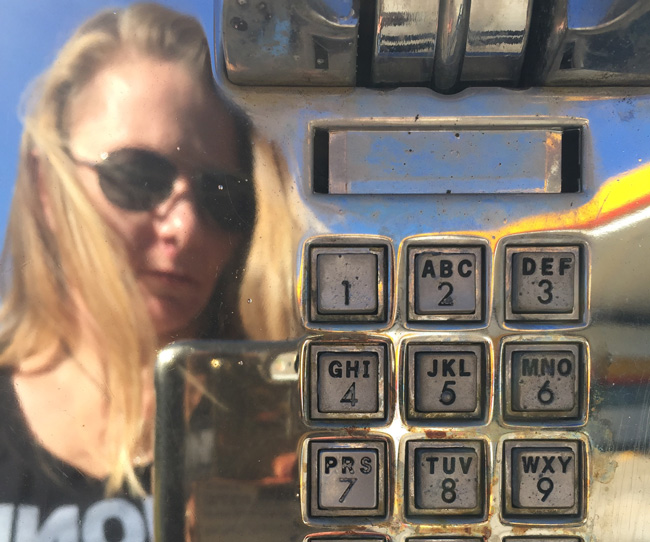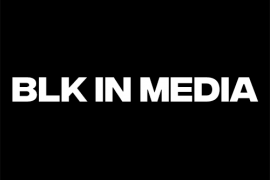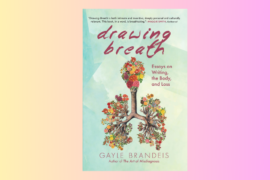How Technology is Altering Our Perceived Boundaries of Intimacy
Julie E. Bloemeke’s poetry manuscript, Slide to Unlock, was recently chosen by Stephen Dunn as a 2016 finalist for the May Swenson Poetry Award. Slide to Unlock has also been a semifinalist in six book prizes since 2014, including the Hudson Prize, the Washington Prize and the Crab Orchard Review First book award. A recent 2016 fellow at the Virginia Center for the Creative Arts, Julie‘s work has appeared in numerous publications and anthologies including Gulf Coast, Poet Lore, Chautauqua Literary Journal, Bridge Eight, the Southern Poetry Anthology and others. In 2015 she won the ekphrastic poetry competition with the Toledo Museum of Art where he work was on view with the Claude Monet collection.
She’ll be reading her work at Vagabond Coffee Co. on Saturday, October 15 along with Kristen Arnett and Jayleen Cerda as part of our Abridged Reading Series. Details here.
Jared Rypkema: Hey Julie! I’m so pleased to have the chance to speak with you. So, a funny thing happened recently. As we all know, one of the risks of writing about technology is the ever-altering nature of it. In the process of working on this interview, Apple released an update that caused the home screen phrasing to change from “Slide to Unlock” to “Press Home to Unlock.” Your manuscript is called Slide to Unlock, so I have to ask, what’s your take on this?
JB: I have to laugh—first, because it is a bit of serendipity (especially for someone like me who calls herself a disciple of it) but second because it is as if the universe is reinforcing the notion that poetry is about risk. I knew going in that writing anything around “Slide to Unlock” put me at the mercy of our temporal world and software updates; of course I had hoped the book would be in print before the home screen language changed. But in the end, it is not really an issue. Why? Because part of the exploration of “Slide to Unlock” is about the evocativeness of the phrase, the resonance of it. It was never exclusively about the denotative meaning, though that is the lure that hooks us, right? What connotations are behind the phrases that we daily see—even touch—but forget to read? They are everywhere; and they invite us to play: “Twist to open.” “Mind the gap.” “Slippery when wet.” “Press to exit.”
JR: Haha. We’ll certainly talk more about that, but before we do, I want to ask you the weighty question: what does being a poet mean to you?
JB: Being a poet is a life. James Dickey was fond of quoting Rilke who said, “A poet’s life is a dog’s life, but it is the only life worth living.” He also said that as poets “you suffer more, you’re frustrated more—over things that don’t bother other people. But you also live so much more, you live so much intensely and so much more vitally and with so much more of a sense of meaning, of consequentiality, of things mattering instead of nothing mattering…”
Being a poet inherently defies definition really, but it is, in part, the dedication to the honing of a practice, to truly capturing the essence of something. For me it has roots in the spiritual; I consider it a calling, to see what is divine and reverent in all things, especially the things we take for granted or forget to see. As poets we are trying to bring into words something of the otherspace, the magical, the universality of connection, the place before we were born, the place none of us truly knows. And, God, we know so very little don’t we? And yet we insist we know more because it comforts us to think we do. It gives us the illusion of authority.
I think of one of the first poems I fell in love with, Margaret Atwood’s “Variation on the Word Sleep.” And how that poem ends:
I would like to be the air
that inhabits you for a moment
only. I would like to be that unnoticed
& that necessary.
Just imagine that connection, where love and protection become involuntary, and yet, you are precisely not wanting to call attention to you as a self at all. To truly explore and surrender to how another sees the world, to be lost in the dream state with them. The layers of that! How can you read a line like that and not be forever changed?
In a way, I wonder if this is what I think being a poet ultimately is, to be “that unnoticed and that necessary” all the while creating something with such beauty and truth, such connection to the human experience, that when we read our response is to jump up, full of unmitigated yes, and shout “Amen!” Something that visceral, that evocative!
I hope my work calls attention to what we daily forget to see, take in, notice, appreciate, question, hence the title of my manuscript, Slide to Unlock. Here is this device that we carry over our hearts—think about that–carry over our hips—think about that too—zip next to our bodies—do you get where I am going?– and every day it gives us an order. Consider that. Have you ever paused to read the words, to realize that Slide to Unlock is a command? And guess what? We obey. We respond without question. Three words–like a trinity, like I love you—and here we give our fingers, our bodies, our brains, our time, over to them, sliding and sliding and sliding until we are deeply, well, locked, into the dopamine hit of checking. Checking in, checking out. Connected and disconnected at all at once.
In a way, I wonder if this is what I think being a poet ultimately is, to be ‘that unnoticed and that necessary.
JR: Wow. That’s incredible and a great segue. The manuscript you mention, Slide to Unlock, has been a finalist for multiple prestigious awards, is there something specific you attempted to do with this series of poems?
JB: First, thank you. I can only say that I am continually in awe of the kindness that has been shown to both to me as a poet and to this manuscript. I have been stunned by how complete strangers—editors, fellow poets—have come into my orbit solely through the submission process to remind me to keep going. You included! I am in awe of so much unexpected graciousness, and of the sheer love that so many folks have for words. It is awesome.
Slide to Unlock has been hovering on the transom; I long for it to propel forward to print of course. But I am a disciple of serendipity. Every time I begin to doubt the process, I think of these lines from Emily Dickinson: “this is my letter to the world” and “her message is committed to hands I cannot see.” And so it is with this too.
My hope is that Slide to Unlock dials into our (mis)perceptions of intimacy and our (dis)connection to and with visual art, photography, memory, and geography. By traversing through our ever-altering relationship with–and our increasing reliance on–the digital and the phone, the idea is that it might invite the question of both the potential healing and danger of allowing the past, and our past selves, to re-enter the present. Further, the thought is to introduce a space where handwritten letters, text messages, email, and voice conversations help to define both our landscape of self, and our navigation within the raw complications of love.
And, of course, I hope that the conduit of my subjective experience ultimately reflects some sense of universality. If those poems heal, reach, change, resonate, then I am doing the work for them that I promised. I am honoring what I am called to do.
JR: Beautiful. You used the phrase, “doing the work for them that I promised,” can you unpack that for us?
JB: I have never believed that the poems are of me, but rather something that comes through me. Ruth Stone described this in an interview where she says she could feel the poem come over her as “a thunderous train of air…barreling down at her over the landscape.” And her job was to grab a piece of paper fast enough so that she could catch the poem it before it passed her by, before it went on “looking for another poet.” I love this image and this mindset. I long to get the words on the page the way they wish to be on the page, not the way I think they should be on the page. My work, as James Dickey often told his students, is to listen with my blood. When we try to control the poem, to overwrite it, to make it something we wish, we lose it. I am grateful every time a poem chooses me, choses to shape itself through the lens of how I perceive. I consider it all very reverent. And messy. It drives me to madness. I fail. I sometimes get it. But the learning, the growth, is in the process.
JR: I love this. There’s something so organic and, to use your word, “spiritual” about it. You mentioned that the manuscript looks to, “traverse through our ever-altering relationship with–and our increasing reliance on–the digital and the phone.” Tell me more.
JB: I have, as the Victorians would say, a mania for the question of how technology is defining and altering our perceived boundaries of intimacy. My hope is that Slide to Unlock plays well on this field, shifting the prism of each poem to slow us down enough to think of the consequences of how our communication and our perception of what it means to truly connect is changing. In part, it is a love affair with technology, the evocativeness of it, the way it shapes us. How many people have come into our lives—or back into our lives—through the advent of the internet? How many relationships have we had online and not in person at all? How does the space of email, text, phone calls, allow us to create a perception that may only be a perception?
Ultimately I hope the book explores this as well: when we distill ourselves to the cursory and abrupt language of the text message what do we lose? What do we deny ourselves by not making space to greet those we see, make eye contact, say thank you, say I am sorry? So much has been corrupted by this phrase: “I apologize for nothing.” Well, when that is used as an excuse for lack of accountability that is cowardice at its finest. If you make a mistake, be self aware enough to own it. But we don’t. We hide behind emails and texts, unanswered calls, and it not only acceptable, it is now respected, even revered, to say we are too busy. Too busy to connect on a human level? Too busy to not say, “It was my fault. I am sorry. Let’s work on it?” We make inferences when people do not respond to text messages; we create whole stories for their motivation, our self-protection. And it is killing us. Instead of calling to talk, we make assumptions. Instead of having dinner, holding hands, trusting to work through in a conversation, we are tempted to pull out our phones, tune out, shut down. It’s easier, we think, to ignore it. But it always comes back in another form, often more vehemently and with more consequence than before. And for a moment of levity–have you seen the Key and Peele skit about this? Beyond brilliant, the way each person on the other side of the phone creates an entire narrative out of his perceived take on the tone of the person he is texting with. See clip here.
My hope is that Slide to Unlock will–as one of the last lines of the book says, admit—many stories, and expand the narrow definition we seem to have culturally about love. It seems to be wrong to acknowledge or own that we still hold feelings for former lovers, as if this is something we are expected to forget, protect, dismiss, underplay, or deny. Even be ashamed of. But those experiences formed us, taught us. They led us to who we love now. To paraphrase Marianne Williamson, those that came before us taught the person we love now how to love. Why are we not thankful for them? They are our brothers and sisters. Sure, it’s a tall order, but it is one worth attempting to navigate.
Ultimately I hope the book explores this as well: when we distill ourselves to the cursory and abrupt language of the text message what do we lose?
I wanted the poems to do the impossible, as I always seem to want to do. To be both of the moment—technology—and somewhat timeless. It may seem an inherent contradiction, but when you look at the layers of metaphor, suggestion, implication in our language of technology, it is hard not to be heady about this stuff. I mean, just think about it! Device. Send. Press. Home. Unlock. Open. Keys. Digital. Hold.
I have a poem in the latest issue of Muse/A, one that did not make it to the final manuscript, that plays with this:
Only this sudden heaviness
over my hip, burning deeper
into the seam…
…the I that claims itself
first-person phone, the taunt of key/
stroke, pass/code, voice/
mail, our answering/machine
What really are we doing when we are “performing” these functions? Are we admitting an energy that can heal or that can destroy? I’ve seen it go both ways: a friend receives a long-awaited but unexpected apology from a childhood bully—a rogue friending over Facebook that allows the conversation—and suddenly her life shifts into a place of healing that it could not have before. Alternately, a high school girlfriend follows a crush on Twitter and a marriage ends as a result. Would any of this had happened in a time before technology? If, in order to make the connection we were required to meet face-to-face?
JR: Something that changes our story?
JB: Yes. I am in love with story. With metaphor, with our quiet, resonant, symbolic acts of love.
I think of a friend’s father who still wears a ring given to him by his first wife—even though he married again and lost his second wife. When my friend, his daughter, asked him about the ring, she did not know it was from her mother. He had been wearing it for years; he told her he would always wear it, as homage and tribute to their connection, the children that they had together, the years that they did share.
I love the resonance of his choice, the sacredness of it, the fact that he did not let on about the ring until asked. It is stories like this that pushed me to include my own talisman in the manuscript—a painting that I fell in love with as young girl in the Toledo Museum of Art—“Antibes Seen From La Salis.”
In the book, it appears and reappears, not just as the painting itself, but through photography, through imprint, through its travels on the walls of different museums. It too, is an homage and a tribute both to “our younger unstained selves” as I write in “Email From Museo Correr,” but also, it is my way of sharing my gratitude for Monet—if you have not read his letters you must—and for the Libbey family who founded the Toledo Museum of Art on the principle that it was the city’s museum, setting the museum’s endowment up in such a way that there was never a charge for admission.
Because of this, I practically lived in the museum as a teenager. It was my refuge, and one of the earliest places I knew I would be an artist; it was and still is my home. And to be able to write about it in this book, to shine light on that spectacular collection, was an incredible experience in fulfilling a debt of gratitude. It has been beyond.
My hope is also that each poem could both stand alone function as part of a larger narrative arc, a bit of a stretch for poetry. And since I am a believer that we doing our best work when we look our fear into the eyes, I wanted to push the boundary on the sentimental without being precious or sappy. I am a romantic; I believe in gestures that hold great weight; I believe in the power of kindness and thoughtfulness. There are distinct characters in the poems; each one elevates the energy of the other by having a reverence for the gesture, by believing in serendipity. Nothing is coincidence.
I am a romantic; I believe in gestures that hold great weight; I believe in the power of kindness and thoughtfulness.
I knew I had this book in my body at age 17. I did not know it was book of poems. I did not know I would write and scrap an entire other poetry manuscript first before this one could come. At times I resisted: Do I have to write about this again? Why? It is going to make me feel and God knows where that will take me. And then I realized—in that wonderful bit between Louis CK and Conan–that it was precisely about that: View here.
Feel that “forever empty.” “Let the sadness hit you like a truck.” Look longing in the face and feel it. Look loss in the face and feel it. Look regret in the face and feel it. We want to downplay it, to tell ourselves it doesn’t matter. But it matters profoundly. Because in not feeling the sorrow we are also not feeling the profundity of love. And why would we deny ourselves that?
We have formed an entire language out of silence. And when you consider Mary Oliver’s line “the soul exists and is built entirely out of attentiveness,” it is hard not to wonder what trauma we cause others and ourselves by denying conversations we are meant to have–both within ourselves and with others—especially those that are painful, that cause us to confront our fears, that make us uncomfortable and vulnerable. And yet, they are the conversations that allow us to truly grow, to see, to change, to evolve, to embrace. I am not exempt, mind you, but the question of how this is cumulatively impacting intimacy stays with me. It haunts all of us.
And that, too, is what I hope the poems truly explore and navigate.
JR: I’ve had the pleasure of hearing you read before. It’s powerful. Does your approach to reading your work differ from the act of writing?
JB: First of all, thank you. As an introvert, anticipation before a reading scares the bejesus out of me. Poets, writers, artists, we all work so much in the realm of the solitary and reflective. To then read becomes such an act of stark exposure; I have always wrestled with this.
But here is how I have started thinking of it: each poem has its own sentience and personality. When I read, I am introducing that being not through me, but through a persona. One of my favorite poems to read is one that is entirely apocryphal because it gives me permission to step into that other, to remind myself that though the impetus of the poems may (or may not) have come through highly intimate personal experience, the lines that evolved from that are in service to the poem, not to me. I enjoy reading the poem because inevitably, afterwards, someone will come up to me with a sly expression and say, “Ok, when did that happen?” Or they will say, “Oh come on. Who was that about really?” And that tells me that the poem is doing its work in terms of verisimilitude. It has hit on something that we all have questioned, thought, experienced. And that’s the high, isn’t it?
JR: Certainly.
JB: And yet it still does not, nor will it ever, feel like a poem I have written. It truly came through me.
Dickey has a great essay about reading and public persona called “Barnstorming for Poetry”: “That, in fact, is his problem: the living-up-to, the giving them what they want, or might be expected to feel entitled to from a poet aside from the poems themselves. “Just be yourself,” he told himself in the beginning. Ah, but what self? The self he becomes on a trip [reading] bears but little relation to the self he left at home…”
I decide what I will read beforehand and make notes. I record myself and work to hone my ability to present the poems. I enjoy having a sense of what I call “planned spontaneity.” I never want a reading to feel forced or staid, but to do anything “off the cuff,” as they say, has a tendency to paralyze me.
JR: Well, I’m certainly looking forward to hearing you again. My final question is one I like to ask artists. Is there something that you’re fascinated with today? Has it found its way into your writing yet?
JB: Yayoi Kusama and the upcoming “Infinity Mirrors” exhibition. It is her first North American tour in nearly two decades; I can hardly wait.
I am completely taken by stories of forgotten or overlooked artists and inventors, particularly those who lived gracious and generous lives and slipped off of the radar precisely because they did not call attention to themselves. Arthur Hughes, the Pre-Raphaelite painter, who I have tried, and failed, to write about for years. Walter Hunt, who holds the patent for the modern version of the safety pin, who I did write about, and had the pleasure of reading his persona poem, “Pinned,” at the Dancing Poetry Contest in 2012; it was later included in the My Cruel Invention Anthology.
Odes and ekphrastic poems, all toward my next book. Stay tuned.
Gratitude. Kindness purely for the sake of kindness. The serendipity of 2017.
Paris. Frida Kahlo. James Dickey. Leonardo DiCaprio. Antibes. Diatoms.
And scotch.




